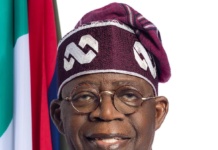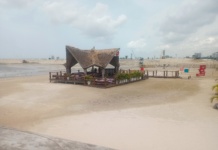By Peter Olorunnisomo – Two international football tournaments of the highest order to Africans are still on and there has been such sensibility over how much football now means not only to the world but to home-based African players.


The Cameroonian ladies in the week gone by felt so irked by the referee’s interpretation of the Video Assistant Referee (VAR) that their complaints was easily arrogated for holding up the game in protest. The Confederation of African Football (CAF) is looking into that.
The honour in their Cameroonian ladies actions is in the commitment and conviction that the referee with aid of his assistant, VAR, was deluding them of righteousness. The greater pain, methinks, would be in the emoluments, which at that point, would be unbearable to lose. It was much acceptable to be plainly beaten where doubt could not rear its head.
At the on-going TOTAL African Cup of Nations, the individuality of histories where players’ protests hang largely on the treatment they receive from their national Football Associations has been the revelation.
It now has more to do with the integrity of the national FAs than with the honour of playing for their countries – courtesy of the crippled integrity these FAs have instituted.
The latest news is from the Uganda Cranes who, last Tuesday, became the latest to strike over payment of performance bonuses. In fact, their training ahead of a last 16 tie against Senegal was called off.
The training scheduled for 19:00 hours local time at the Arab Contractors stadium was called off, amidst rumours that the players were striking over the non-payment of bonuses worth $6,000 per player for the group stage win and draw against Democratic Republic of Congo and Zimbabwe respectively.
The country’s football federation (FUFA) however insists that the players have been paid all their match bonuses, including allowances covering the one and a half months of training camp they had before the tournament.
According to FUFA, each player has so far been paid a total of $14,600 as of Tuesday. The money includes $4000 for their win against DR Congo, $2000 (Shs7.4 million) for the draw against Zimbabwe, $5100 each for 34 days of camping till June 30th at a rate of US$150 per day, $420 for 14 days of camping in Uganda and $300 for an international friendly against Ivory Coast played in Abu Dhabi.
FUFA on Wednesday said the team had regrouped and were ready for training ahead of the crunch tie against Sadio Mane’s Senegal.
‘‘The players and technical team of Uganda Cranes have regrouped for post-match analysis of the match against Egypt, and plan for the evening training session at 7pm today (Thursday) and Senegal on Friday,’‘ read FUFA’s tweet.
Nigeria’s national team at the Africa Cup of Nations (AFCON 2019) staged a strike over unpaid bonuses, when it refused to train ahead of Wednesday’s clash against Guinea.
Nigeria’s Super Falcons who represented the country at the Women’s World Cup in France also staged a sit-in strike at a hotel, while Cameroon and Zimbabwe have also come to AFCON 2019 with unresolved payment issues.
The Super Eagles of Nigeria who had been striking over unpaid bonuses at the 2019 Africa Cup of Nations and eventually suspended their strike on Tuesday.
The players had reportedly not received a $10,000 match bonus that they had each been promised.
The team finally agreed to train in Alexandria ahead of their game against Guinea in Alexandria, after the Nigerian Football Federation promised to pay a win bonus from their 1-0 victory over Burundi on Saturday.
Nigerian Football Association spokesman Ademola Alajire said the matter had been resolved, conceding that funds for the tournament had arrived late.
The Nigerian under-20 team and the women’s team, whose world cups are on-going in Poland and France respectively, also went on strike over unpaid bonuses.
Cameroon’s arrival at the tournament in Egypt was delayed by 24 hours when the squad refused to board their plane in Yaounde while they haggled over increased appearance fees and bonus monies.
They eventually boarded after negotiations with government officials and coach Clarence Seedorf suggested on Sunday that the experience might well turn out to be a positive.
“All teams in the world at some point in their history experience such troubles,” said the former Netherlands international and four-time Champions League winner, “but it will not affect our morale or our preparations.”
“Actually the bonus crisis has reinforced the team spirit and the determination within the squad to perform well. There was some tension but the players have behaved maturely and they’ve decided to be here to fight for Cameroon.
Cameroon won their tournament opener against Guinea Bissau at Ismailia on Tuesday, and are top of Group F after Benin and Ghana settled for a 2-2 draw in the other Group F game.
While Zimbabwe’s football federation denied allegations that the national team threatened to boycott AFCON 2019 over a pay dispute, the team’s striker Khama Billiat said he was happy with his country’s performance against Egypt ‘under the circumstances’.
“ZIFA and Warriors have signed a contract and both parties will honour and respect all contractual obligations,” the football association had reiterated before the tournament opener.
Indeed, last season in Cameroon, not only bonuses but basic wages from the clubs were not being paid, forcing players across the country’s top divisions to stage a series of strikes.
Eventually, former Indomitable Lions captain Geremi Njitap filed a complaint direct to FIFA, which resolved the matter.
But the episode highlighted the important role that international appearance bonuses have for some players.
Sometimes, however, these payments do not appear after the tournaments. Some football associations have little accountability; others are opaquely managed – and even end up being suspended by FIFA.
Over time, players have grown deeply distrustful of the very football federations they are picked to represent.
So, aware that after a tournament their ability to exercise pressure individually on their FA is greatly diminished, they strike before the competition begins.
By threatening not to play, players create a double bind for their countries. Not only would it be damaging for their image, it also would dramatically reduce any money that the FA would be looking to get themselves.
The tactic has proved effective over the years – having been employed by at least one African team at every World Cup since 1990.
What’s more, star names in teams over the years, such as George Weah and Didier Drogba, have been much higher-profile than their country’s FAs – and have not been afraid to use their presence to support their less well-known (and well-off) team-mates.
Indeed at some tournaments, a country’s president has had to personally intervene in order to get things going again.
Famously, in Brazil in 2014, $100,000 payments for Ghana were flown in, in cash in briefcases, and unloaded at the airport in Rio – where the Brazilian authorities took a 17% cut, before the money was sent out across the city to the players.









